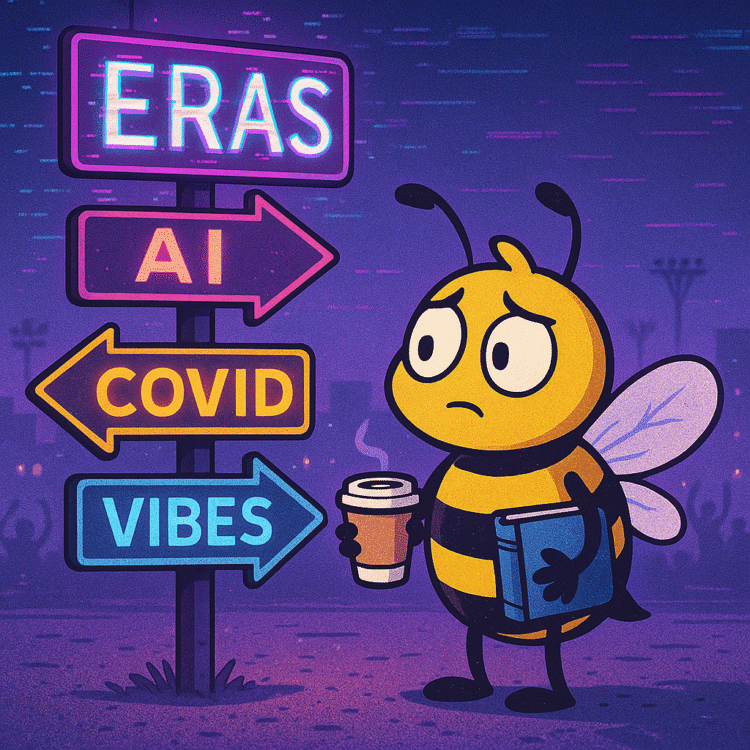
At some point between Clorox shortages and ChatGPT writing your cousin’s wedding vows, we blinked—and it was 2025.
We survived a global pandemic, gave our data to robots with better grammar than our exes, and got emotionally waterboarded by Taylor Swift’s discography not once, not twice, but three times. We’ve lived through Folklore, Midnights, and the re-recorded soundtracks of our teenage mistakes, now in Dolby Atmos.
So… now what?
Because if you thought there’d be a parade, or at least a government-issued emotional support croissant, I have bad news. What we got was $7 iced coffee, twelve new streaming platforms, and the unshakable feeling that your therapist is using AI to write your progress notes.
The Pandemic Taught Us Nothing, But It Taught It Loudly
In 2020, we learned to bake bread, cut our own bangs, and pretend we were okay on Zoom. Now in 2025, we’re just… raw-dogging the air again. No masks. No boundaries. Just vibes and viral load.
We watched people die, watched billionaires profit, and watched Instagram wellness influencers tell us to “raise our vibration” instead of demanding healthcare. And after all that? We ended up back at brunch. Ordering the same overpriced eggs. Acting like nothing happened.
But something did happen.
We broke.
Quietly. Collectively.
And most of us never admitted it out loud.
Then Came the AI Revolution—Because Therapy Was Too Expensive
Somewhere in between pandemic waves, someone decided the solution to emotional collapse was to make Siri smarter and more codependent.
Now, your resume is written by ChatGPT. Your Hinge date sent you AI-generated compliments. And your job just replaced you with a Canva plugin.
Don’t get me wrong—AI is impressive. But it also means we’ve replaced human mediocrity with faster, more confident mediocrity. And worse? We started outsourcing feeling.
Remember when we used to have writer’s block and call it “process”? Now, it’s “prompt fatigue.”
Remember when loneliness was just… sad? Now it’s an app feature.
AI didn’t take over the world.
It just convinced us that outsourcing connection was efficient.
And Then Came Taylor
If the world was ending slowly, Taylor Swift made sure it ended cinematically.
She gave us breakup songs for breakups we haven’t had yet.
She gave us re-recorded albums that made millennials cry in Target.
She gave us Eras—and suddenly, identity became merch.
In a collapsing world, she offered a blueprint: rebrand, re-release, and pretend the old version never existed. Honestly? Iconic. Emotionally manipulative? Sure. But have you tried screaming “Would’ve, Could’ve, Should’ve” alone in your car at midnight?
It’s church.
It’s therapy.
It’s capitalism in a cardigan.
So What Now?
We survived a pandemic that broke our systems, a tech boom that rewired our humanity, and a pop star who turned collective grief into ticketed events.
But survival isn’t the same as healing.
Now we’re left with questions no algorithm can answer:
- What does real connection look like in a world curated for performance?
- Can we sit in silence without refreshing?
- Are we brave enough to stop rebranding our pain and just feel it?
There’s no twist here.
No motivational coda.
Just this: You’re still here.
And that counts.
If you’re tired of streaming trauma and outsourcing joy, maybe it’s time to unplug for a night and crack open a book. Not just any book—one of mine.